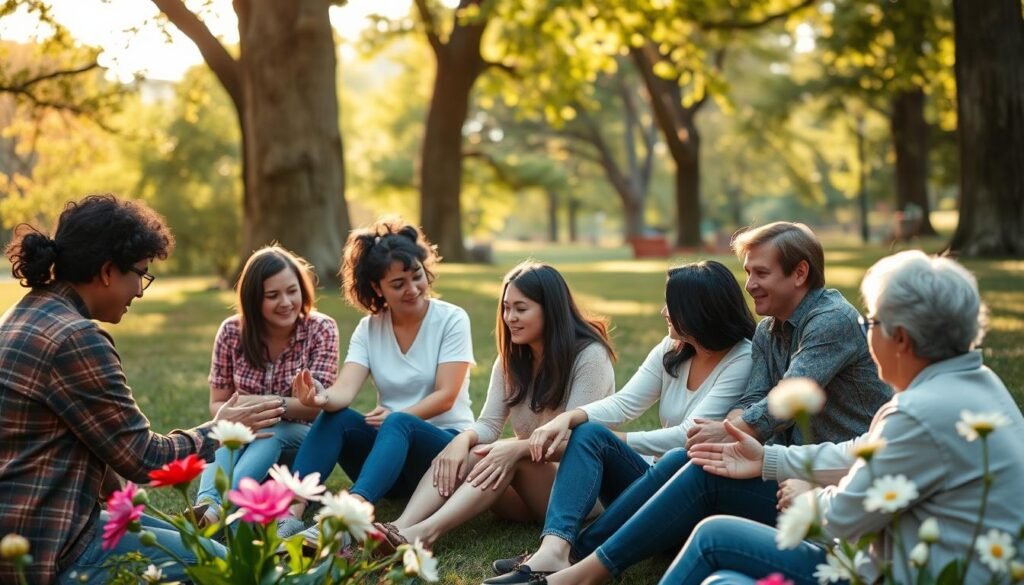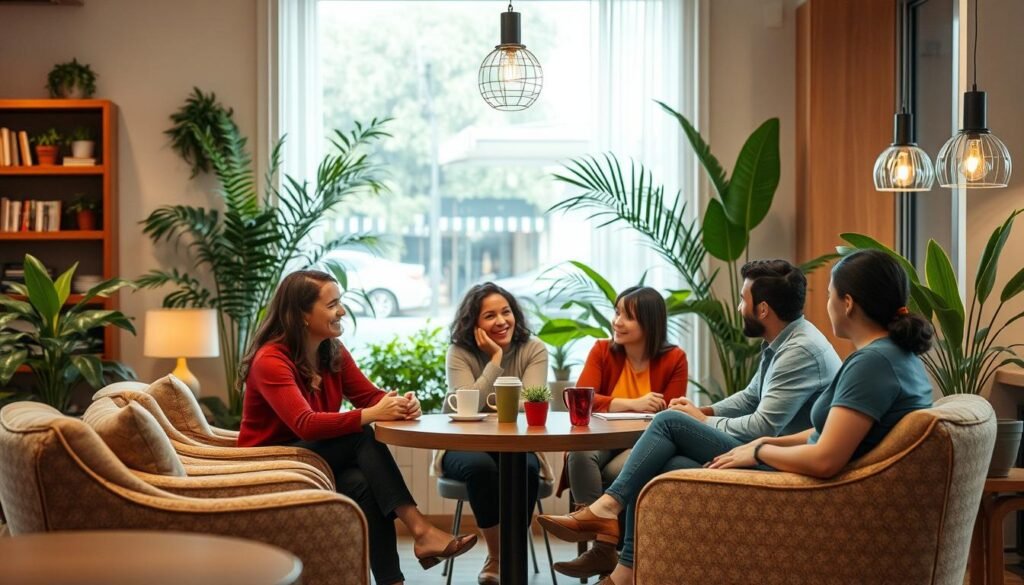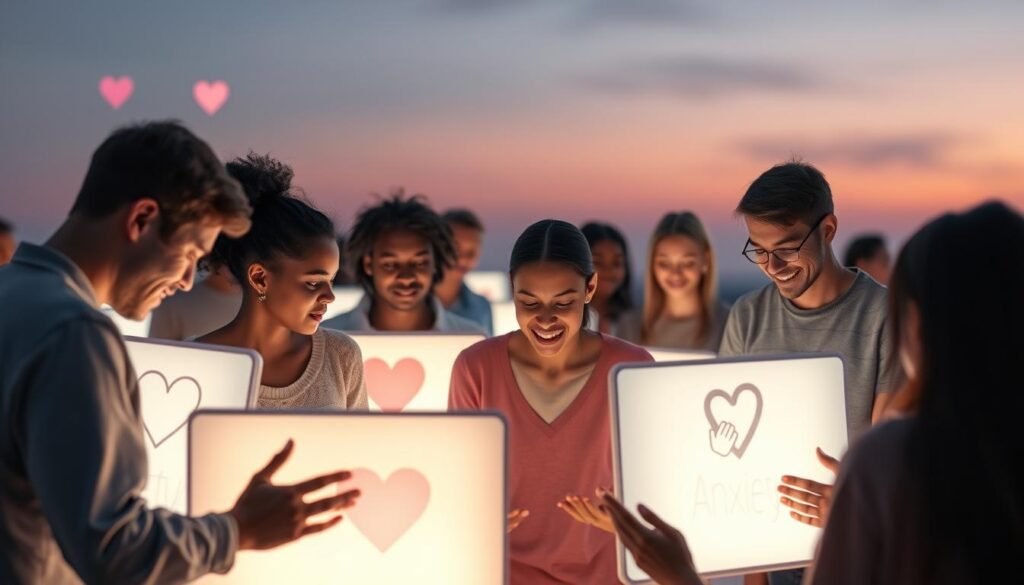Did you know about 19.1% of adults in the U.S. face anxiety disorders annually? This shows the critical need for community support for those dealing with anxiety’s challenges. Finding such support is key not just for comfort, but also for better health. By sharing experiences, people find valuable mental health tips and effective coping strategies.
Connecting can happen in local groups or through lively online forums. This article explores how being part of a community can change the lives of those with anxiety.
Key Takeaways
- Around 19.1% of U.S. adults face anxiety disorders each year.
- Community support plays a crucial role in managing anxiety.
- Accessing mental health resources can provide significant relief.
- Engaging in anxiety support groups encourages shared healing.
- Online forums offer flexible options for connection.
- Implementing coping techniques is easier within a supportive community.
Understanding Anxiety and Its Impact on Daily Life
Understanding anxiety helps in dealing with its daily effects. Anxiety shows up in many forms, such as Generalized Anxiety Disorder (GAD) and Social Anxiety Disorder. These disorders can change how a person handles daily tasks, work, and relationships.
People with anxiety often face both physical and emotional signs. They might feel restless, tired, and find it hard to focus. Social situations can become more stressful. This can influence how they interact with others. Anxiety can also harm physical health, leading to issues like tension headaches or trouble sleeping.
For more information, the Anxiety and Depression Association of America offers great insights. Understanding anxiety means realizing its complex effects on life. It’s more than just spotting the symptoms.
Importance of Community Support for Mental Health
Community support is key for good mental health. It lets people feel they belong and connects them with others who get what they’re going through. Being part of a community helps build strong social ties, which are crucial for mental well-being.
Studies show social support improves health for those with anxiety. Community efforts offer friendship and a safe space for sharing mental health resources. People can find support in groups, volunteering, or events that bring people with similar interests together.
Being isolated can hurt mental health and make anxiety worse. Creating an inclusive community helps everyone feel important and boosts emotional strength. Meeting people who share your experiences can create a supportive network.
Thinking about what you enjoy can help you find your community. Whether it’s through charity work, spiritual groups, or local activism, getting involved makes a difference. To learn more about community’s role in mental health, check out this resource.

Finding Community Support for Anxiety
Finding the right community support is key to handling anxiety. Joining local support groups helps share stories and gain mutual understanding. We’ll show how to find and connect with these groups.
Explore Local Anxiety Support Groups
Start by looking for community resources. Many organizations and centers provide help, like weekly meetings or workshops. Groups like the National Alliance on Mental Illness (NAMI) and Anxiety Support Communities are great places to begin.
They offer a safe space to express feelings and learn how to cope. Here’s a helpful table of resources:
| Organization | Type of Support | Contact Information |
|---|---|---|
| National Alliance on Mental Illness (NAMI) | Support groups, educational materials | (800) 950-6264 |
| Anxiety Support Communities | Online forums, local meetings | Website: www.anxietysupportcommunity.com |
| Local Community Health Center | Therapies, group sessions | Call to inquire about local support |
Connect with Peer Support Networks
Peer support networks are great for emotional help. They connect people who understand what you’re going through. Local groups help foster encouragement and reduce loneliness and anxiety.
Try contacting community centers, libraries, or browse online for peer-led meetings. These connections can be very supportive.

Online Resources for Anxiety Support
Today, those looking for help with anxiety have many online options. They can find support and connect with others without leaving their home. Online forums and virtual therapy sessions offer varied support.
Utilizing Online Forums for Connection
Online forums are great for those with anxiety to share and get advice. Sites like Reddit offer a space to ask questions and feel supported. This can make people feel less alone.
The privacy of these forums encourages honest talks. People can share openly without worrying about being judged. This can help in expressing feelings freely.
Accessing Virtual Therapy Options
Virtual therapy makes getting mental health help easy. With services like BetterHelp, people can talk to therapists anytime. They can choose video, phone, or chat options.
This kind of therapy is very flexible, fitting into anyone’s schedule. It helps people get support no matter where they are. This has opened up help to those who couldn’t get it before.

Coping Techniques to Discuss in Community Settings
Community settings are great for sharing and finding ways to deal with anxiety. People talk about relaxation and mindfulness to help manage anxiety. This also builds a supportive environment.
Joining these discussions can boost personal growth and resilience against anxiety challenges.
Relaxation Strategies for Anxiety Relief
Relaxation methods can really help with anxiety. Deep breathing and progressive muscle relaxation bring calm quickly.
Practicing these techniques:
- Deep Breathing: Slow, deep breaths for a few minutes lessen tension.
- Progressive Muscle Relaxation: Tensing and relaxing muscles group by group makes the body relax.
- Visualization: Picturing a calm scene can take your mind off stress.
Talking about these strategies helps people share their stories and advice. For more on anxiety coping, check out Verywell Mind.
Mindfulness Practices to Share with Others
Sharing mindfulness helps manage anxiety better. Some good techniques include:
- Meditation: Being in the moment reduces anxiety.
- Guided Imagery: Guided sessions lead to relaxation and clear thinking.
- Yoga: It mixes poses and breathing for better relaxation.
Discussing these at support groups lets people learn from each other. These practices are great for both personal and community growth. For more on community support, visit Mood Care.
| Relaxation Strategies | Mindfulness Practices |
|---|---|
| Deep Breathing | Meditation |
| Progressive Muscle Relaxation | Guided Imagery |
| Visualization | Yoga |
How to Start Your Own Support Group
Starting a support group can be rewarding. It helps connect people who face similar anxiety challenges. This guide will help you create your own support community.
Choosing the right location is key. Look for a space that’s comfy and easy to get to. This could be community centers, libraries, or online platforms.
Choosing the right person to lead is important. A good leader makes everyone feel welcome. They should set rules that ensure respect and privacy. It’s also good to have an agenda to keep things focused.
To get the word out, use social media, local health centers, and community boards. A compelling story about your group will attract members. This strategy helps find people who need support.
It’s critical to have helpful materials for the group. Offer information on anxiety, ways to cope, and local resources. This supports the group’s growth and learning.
Learning from experienced leaders is helpful. Their stories and tips on dealing with problems are valuable. They can show you how to create a supportive space.
By taking these steps, you can create a strong support network. Your group will not only help its members. It will also bring people together, creating a sense of community.
Self-Care Routines to Enhance Community Support
Self-care routines are super important for our mental health. They make community support better too. Having a good daily plan helps us and those around us. We learn and share ways to deal with tough times. This keeps us all feeling connected.
Creating a Balanced Daily Routine
Keeping balanced every day keeps us emotionally stable. Here’s what we can do:
- Setting aside time for mindfulness or meditation to ground oneself.
- Establishing a consistent sleep schedule to promote rest.
- Incorporating regular meals to fuel the body and mind.
- Making time for both work and leisure activities to create balance.
Incorporating Stress-Relief Activities
Adding activities that lower stress is key. Here are some ideas:
- Engaging in physical exercise, like walking, yoga, or dancing.
- Practicing journaling to express feelings and thoughts.
- Spending time outdoors in nature to clear your mind.
When we focus on self-care, we help our communities too. Our journey helps others feel inspired. We all share in these helpful habits.
Conclusion
Finding support for anxiety in a community is key to better mental health. It’s really important to connect with others who understand what you’re going through. This sense of belonging can make a big difference. In this article, we’ve talked about how joining groups, locally or online, can help those with anxiety.
These anxiety support networks are great for feeling less alone and stressed. Starting on the path to mental wellness means both looking for help and getting involved with others. Sharing stories or doing activities like relaxation techniques together is really helpful. Studies show that feeling part of a community can decrease depression, anxiety, and stress. This is why it’s important to be active in these networks. You can read more about this at improving mental health outcomes.
We encourage everyone to look for different support options. Sharing your own experiences with community support and managing anxiety can inspire others. Every story contributes to a bigger picture of hope and fighting back. By making connections and getting involved in community engagement, you can take big steps toward a happier, healthier life.